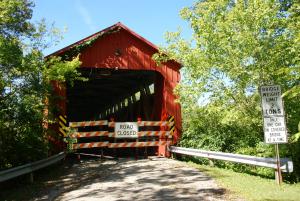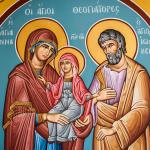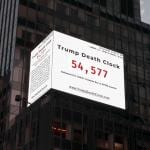
A bridge, worn down, and not safe to travel across, is closed for repairs. Those who normally use it have to find other ways to get to their destination. Many of them are greatly inconvenienced, and yet they recognize it is better to go through such an inconvenience than to travel across a bridge which is about to collapse. If a conspiracy theorist, with no engineering knowledge, claimed the bridge was safe and that the authorities are trying to prevent people from riding across it to limit their freedom, suggesting it is the first step of stopping people from driving altogether, most people would recognize how absurd such a claim is. The bridge is shut down temporarily so that it can be fixed and able to be used again – it is being repaired in order to make sure people have the freedom to drive on it, not to stop that freedom.
A Catholic man, with many thoughts going in through his head, is driving to church; he is not paying too much attention to the road. As he nears an intersection, the traffic light turns red, but instead of stopping, he drives through the intersection and into oncoming traffic. He gets into an accident. Now, he can stay where he is, wait for the police in order to have a proper report made for the accident, or he can drive off, go to church, and fulfill his obligation. He knows his duty is to stay where he is, to make a proper report to the police, even if it means he has to miss church. He knows he can’t say, “church is essential, and so it overrides my civic duty.” He has to stay, and do what he can to make things right. It would be foolish for him to say that authorities are trying to stop him from going to church, that they want to limit his freedom. So he stays, and does what is right. It is an inconvenience, but it is one which he has to put up with, because he is responsible for the accident and he has to do what he can to rectify the situation.
In reflecting upon both situations, it should be clear, we often have to do things which we would rather not do. We do not like to be inconvenienced, and yet, we know, we often have to suffer through inconvenience in order to have our normal freedoms preserved. If we do not allow authorities to close roads and bridges in order to repair them, we will lose them, and then we will lose the freedom to drive over them, not just for a short period of time, but forever. Likewise, if we get in an accident, we know we cannot drive away; we have to have the accident reported, and though it will take time for authorities to get where we are at and to interview us in order to get an accurate assessment of the situation, we know we have to stay, even if it stops us from doing what we normally are expected to do (such as going to church). It would be absurd for a Christian to suggest they can drive away and go to church because the state cannot interfere in with their religious activities. It would likewise be absurd for them to say worship of God is the most essential thing, so nothing, not even their civic duty, not even making things right with their neighbor, should get in their way. Jesus many times said otherwise.“ So if you are offering your gift at the altar, and there remember that your brother has something against you, leave your gift there before the altar and go; first be reconciled to your brother, and then come and offer your gift” (Matt. 5:23-24 RSV). If we have something which we must do for our neighbor, we should not use God as an excuse to ignore our responsibility; rather, we must understand that by fulfilling that responsibility, we fulfill our obligation to God (as the parable of the Good Samaritan indicates).
Worship of God is essential, but the means by which engage such worship are not. How we conduct that worship depends in part upon the circumstances in which we find ourselves. We must not ignore our civic responsibilities; we must not suggest that our religious activities, our religious beliefs, should override any civic responsibility. We must not say religious activities cannot be controlled in any fashion by civic authorities. Such a suggestion would be an abuse of religious liberty. As Dignitatis humanae indicated, religious liberty is fundamental but not absolute. It cannot be invoked as a way to ignore the common good and the right and responsibilities expected of people being good citizens. Religious liberty is not without restrictions:
The right to religious freedom is exercised in human society: hence its exercise is subject to certain regulatory norms. In the use of all freedoms the moral principle of personal and social responsibility is to be observed. In the exercise of their rights, individual men and social groups are bound by the moral law to have respect both for the rights of others and for their own duties toward others and for the common welfare of all. Men are to deal with their fellows in justice and civility.[1]
Thus, government has the power and authority to protect the common good against those who would abuse religious liberty and use it as a way to harm others: “Furthermore, society has the right to defend itself against possible abuses committed on the pretext of freedom of religion. It is the special duty of government to provide this protection.” [2] Government should not act arbitrarily, instead, it must have just reasons for what it does:
Its action is to be controlled by juridical norms which are in conformity with the objective moral order. These norms arise out of the need for the effective safeguard of the rights of all citizens and for the peaceful settlement of conflicts of rights, also out of the need for an adequate care of genuine public peace, which comes about when men live together in good order and in true justice, and finally out of the need for a proper guardianship of public morality. [3]
Pointing out that the norms should be just and equally applied must not be confused with outcome, but with the process in determining the outcome. If a driver has to stay put and miss church because they were in an accident, it is not arbitrary to have him do so, while others, who are not in an accident, can continue to drive on and go where they want to go, be it a church, a grocery store, a movie theater, or a bar. For the others on the road do not have the same conditions applying to them: they are not the ones who were in an accident. So it is not a violation of religious liberty to have that one driver miss church while other driver are allowed to continue on their way, wherever they want to go.
Likewise, when dealing with COVID19, governments must make judgments on the way restrictions are put in place, taking into consideration both the way the virus is spread, but also what is necessary for life, for society to continue. What is necessary relates to the way the state functions and is able to do its work, to provide for the common good and the safety and livelihood of all those involved. Grocery stores, hardware stores, and the like remain open, or at least their goods remain accessible, because what they provide are truly necessary for people to live. Likewise, activities which are not as risky, such as outdoor activities where people are distant from each other (and masked), if they truly are shown to be safe, are allowed to continue. However, other activities, where people are brought close together for long periods of time, in a closed space, such as in a church or other place of worship (if it is indoors), does not meet either the essential nature of a grocery store nor the safety of a wide-open space, and so can be and should be closed in order to keep people safe. The essential nature of worship, the essential nature of the church, as has already been seen, is of a different kind of essence than the essential nature of a grocery store, and to talk about it as essential so as to try to keep churches open as normal is to equivocate on the nature of what it means to be essential. Similarly, to try to use religious liberty arguments to stop such closures ignores the qualifications necessary for religious liberty to be invoked. It is not an arbitrary closure, and the purpose of such closure is for the common good, and not an affront against religion and religious practices.
The essential nature of the church is different from the essential nature of grocery stores since what is important is worship of God and this can be done even outside of church (and, indeed, is expected to be done if there are just reasons why worship in church is not possible, such as in our example with the person having an accident on their way to church). The sacraments, to be sure, are normative vehicles of graces, but God is not bound by the sacraments. The church consistently teaches there are ways to receive such graces if one is unable to receive them in their normative means due to no fault of their own. Christian who cannot go to church because of extraordinary circumstances are not being prevented from what is necessary for them in their lives nor in their walk with God. They can still worship God. They can still receive his grace. On the other hand, those who would be unable to get groceries, or materials to repair their place of residence, or the like, would not be able to get what they need in order to survive and can and would die if those needs are not eventually met. The Christian will not spiritually die if they cannot go to church and receive the sacraments every week; indeed, historically Christians did not do so – in the early church, confession was rare, and in the medieval era, it became the norm to confess once a year; likewise, throughout history, and in many places today (such as in the Amazon), Christians did not receive communion every time they went to church, or even, did not always have church services to go to every week. Nonetheless, they continued to be Christians, to live as Christians, to have faith as Christians, and to thrive as Christians, receiving the graces they need without such access to the sacraments. God will not deprive the faithful of what is truly spiritually necessary, and so to try to suggest, due to an emergency situation like a pandemic, Christians are being prevented from fulfilling their faith is absurd and shows a grave misunderstanding of the Christian faith. Christians who read and follow the Scriptures will know the lessons within, the way Jesus fought against such a cold, legalistic view of the faith, pointing out that doing what is right, helping people in need, protecting and healing them, fulfills our obligations with God and will be rewarded by him in the last judgment.
Religious liberty is not being violated when Christians have to temporarily stop going to church due the coronavirus. Religion is not being put under attack due to the pandemic. COVID19 restrictions have not been put on churches and other houses of worship alone. They are not arbitrary – scientific research is used to understand the nature of the pandemic as well as to suggest to us what is the best way to deal with it so as to stop its spread. Those restrictions are not put in in place as a way to stop our freedom, just as barriers stopping us from using roads under construction are not put in place to stop us from driving. Instead, they are put in place in order to save us so that when the pandemic is over, we can return to normal, to go back to our churches and houses of worship because we will still be alive, just as road work is done in order to make sure that we can continue to drive safely on the roads we use. Our civic duty and obligations can prevent us from going to church, such as in the case of someone getting into an accident while on their way to church; those duties and obligations are not put in place as a way to undermine or subjugate religion, but to protect society and the common good, a duty which most religious traditions affirm. By following our civic obligation, by protecting the common good and the lives of others, we are fulfilling our religious obligation. Just as it would be absurd for one in an accident to drive off and use religion as an excuse as to why they drove away, so it would be absurd for us, in the midst of a pandemic, to use religion as an excuse to ignore our duty to protect and honor each other.
The COVID19 pandemic is an extraordinary situation; because of it, we will find that we can and will fulfill our obligations, including our obligation to God, in an extraordinary way. Likewise, God will give us extraordinary means by which we can and will receive the graces which we need. God is not bound by the sacraments; we can receive the grace of the eucharist apart from the liturgy (indeed, we shall do so, in eternity, which is why many of those who otherwise did not receive communion in their life can and will be saved, receiving the reality of communion and all that goes with it as they find themselves united with and in Christ).
We might not know it, but what has been common for Christians in the West for the last century is rather uncommon historically; we have become accustomed to such an extraordinary historical situation, where we go to church, receive sacraments frequently, that we have ignored what Christian life is about. It is not about receiving the sacraments and going forth and doing nothing else. It is not cheap grace. It is about living in the world, following the teachings of Christ, no matter how frequently we receive the sacraments.
Many Christians, sadly, have turned the Christian life purely into reception of the sacraments while ignoring the reality and life which is expected to be had with them: Christians are to live out the truth of the sacraments, to care for others, to protect and honor them, and if they do not do so, then when they take the sacraments, especially if they do so at the expense of others, they risk receiving the sacraments in vain.
[1] Dignitatis humanae. Vatican translation. ¶7.
[2] Dignitatis humanae, ¶7.
[3] Dignitatis humanae, ¶7.
Stay in touch! Like A Little Bit of Nothing on Facebook.
If you liked what you read, please consider sharing it with your friends and family!













